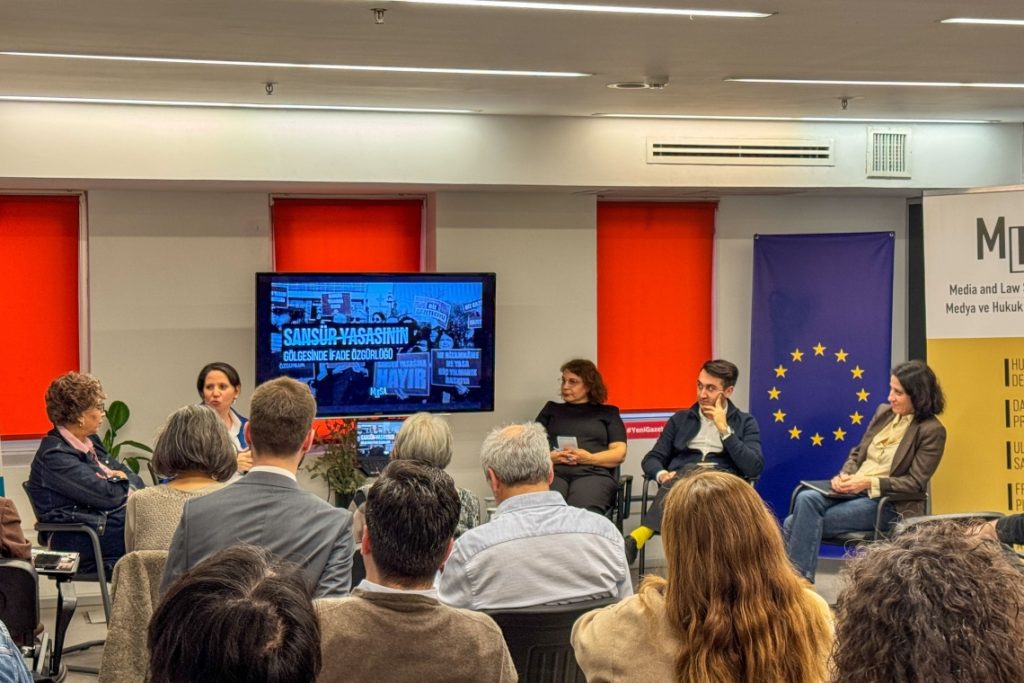The report highlights the growing use of Turkey’s 2022 law against “Public Dissemination of Misleading Information,” with over 4,500 investigations, many targeting journalists. With mounting investigations and growing fears of repression, media freedom advocates warn that unless significant changes are made, the law will continue to erode Turkey’s press freedom landscape, stifling independent journalism and restricting the public’s right to information.

Photo: MLSA
The Media and Law Studies Association (MLSA) has unveiled its latest report, Freedom of Expression Under the Shadow of the Censorship Law, highlighting the profound impact of Turkey’s controversial “censorship law” on press freedom. The findings were presented at a panel held at the Turkish Journalists’ Union (TGS) Academy in Istanbul, shedding light on growing restrictions against journalists and media workers.
A Law That Silences Journalism
The report, authored by MLSA Diyarbakır correspondent Deniz Tekin and presented by MLSA General Coordinator Batıkan Erkoç, reveals the increasing use of Turkey’s 2022 law criminalizing the “Public Dissemination of Misleading Information.” According to MLSA’s research, more than 4,500 individuals have been investigated under the law since its implementation, with journalists making up a significant portion of the cases.
The MLSA tracked a total of 93 investigations related to the censorship law, with 24 of these cases progressing to legal proceedings. Among those targeted, 64 journalists were subjected to more than 80 investigations, highlighting the disproportionate impact on media professionals. Journalists who reported on critical issues such as earthquakes, corruption, and elections faced the highest risk of prosecution, as their work often challenged official narratives. As a result of these investigations, more than 20 journalists were detained, with at least three arrests recorded under the law, underscoring the growing crackdown on press freedom in Turkey.
Experts Warn of Chilling Effect
Following the report’s presentation, the panel discussion as reported in the MLSA website, Truth as a Crime: Article 217/A and Journalism brought together experts to discuss the law’s implications. Moderated by MLSA’s Barış Altıntaş, the panel featured Turkish Journalists’ Union (TGS) Secretary General Banu Tuna, T24 Managing Editor Candan Yıldız, Bianet Women and LGBTQI+ News Editor Evrim Kepenek, and lawyer Enes Ermaner.
Banu Tuna noted that from the outset, press freedom advocates had warned the law would lead to a crackdown on journalists. She expressed concerns that further restrictive legislation could follow if pushback remains weak.
T24’s Candan Yıldız emphasized that the law fosters a climate of self-censorship, as journalists fear retaliation for covering politically sensitive topics. “This law is not just about punishing journalists—it’s about intimidating an entire profession,” Yıldız stated.
Lawyer Enes Ermaner argued that the core issue extends beyond the law itself, pointing to the judiciary’s inconsistent application of legal standards when handling cases against journalists.
Bianet’s Evrim Kepenek shared personal experiences of facing legal action for her reporting and stressed that solidarity among journalists and media organizations is crucial in resisting these pressures. “This law will not stop us. Journalism is not a crime,” she said.

